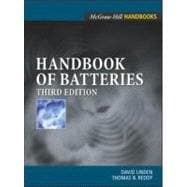
What is included with this book?
THOMAS B. REDDY, Ph.D.was a leader in the development of lithium primary batteries and served as a Vice President of Power Conversion, Inc. (later Hawker Eternacell, Inc.) and Yardney Technical Products, Inc. He continues to act as a consultant to the battery industry. Dr. Reddy is an Adjunct Assistant Professor in the Bio-Engineering Division of the Robert Wood Johnson Medical School of the University of Medicine and Dentistry of New Jersey. He is also a Distinguished Visiting Scientist in the School of Engineering of Rutgers University.
The New copy of this book will include any supplemental materials advertised. Please check the title of the book to determine if it should include any access cards, study guides, lab manuals, CDs, etc.
The Used, Rental and eBook copies of this book are not guaranteed to include any supplemental materials. Typically, only the book itself is included. This is true even if the title states it includes any access cards, study guides, lab manuals, CDs, etc.